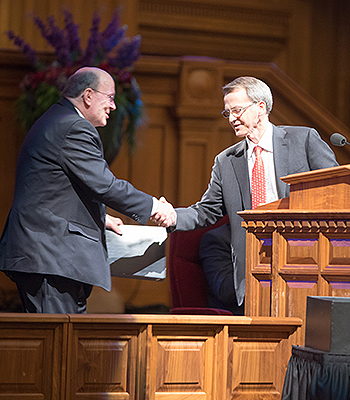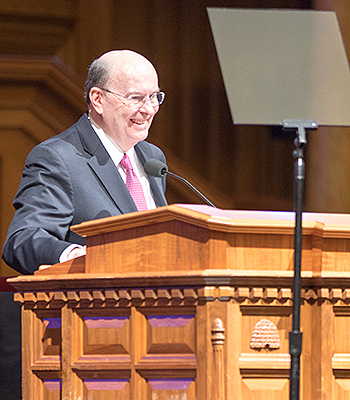Elder Cook Calls on People of Faith to Defend Divinely Derived Religious Freedom
Contributed By Jason Swensen, Church News associate editor

Professor Robin Fretwell Wilson, center, is presented the Thomas L. Kane Religious Freedom Award from the J. Reuben Clark Law Society on February 16, 2018. Elder Quentin L. Cook, second from left, delivered the keynote address at the annual event.
Article Highlights
- People of faith must be at the forefront in protecting religious freedom—a freedom from which many other essential freedoms emanate.
“My plea is that all religions join together to defend faith and religious freedom in a manner that protects people of diverse faith as well as those of no faith.” —Elder Quentin L. Cook of the Quorum of the Twelve Apostles
Related Links
Elder Quentin L. Cook issued an unwavering charge to lawyers, law students, educators, and business professionals who gathered in the Salt Lake Tabernacle: don’t drop the ball on religious freedom.
A member of the Quorum of the Twelve Apostles, Elder Cook delivered the keynote address at the 2018 J. Reuben Clark Law Society Conference on February 16. Elder Cook was given a warm and gracious introduction by William P. Mumma, a Roman Catholic and the chairman of the board of Becket Law. Mr. Mumma has had overall responsibility for Becket’s participation in several Supreme Court religious freedom cases.
“There is a growing number of people who do not feel accountable to God for their conduct and attempt to diminish the rights of those who do feel accountable,” he said. “Many want to eliminate or even destroy religious freedom.”
A large number of the professionals participating in the conference, he added, are uniquely able to defend faith, religious freedom, and accountability to God.
“The Church of Jesus Christ of Latter-day Saints has come out of obscurity and is part of the worldwide conversation on faith. We need to be educated and then participate in a positive manner in protecting religious freedom.”
In his remarks, Elder Cook reviewed the progression of basic principles that have established religious liberty as part of essential or inalienable rights—“the fundamental right of each individual to live according to his or her faith and beliefs.”
The United States’ legal heritage echoes back to the Magna Carta—an important precursor to the protections of religious freedom that came to fruition centuries later in liberal democracies, he said. That pivotal document declared “that the English Church shall be free and shall have its rights in full and its liberties intact.”
“Today, the spirit of the Magna Carta lives on in the religious freedoms secured to churches, religious organizations, and individual believers in the United States and many other countries.”
The American colonies drew heavily upon the Magna Carta in both the Declaration of Independence and the First Amendment to the Constitution.
“That declaration contains the seminal words ‘all men are created equal, … they are endowed by their Creator with certain unalienable Rights,’” he said. “The acknowledgement of God, the Creator of the universe, as the ultimate giver of essential rights is proclaimed in a magnificent fashion and clearly reflects the cherished beliefs of most people.”

Elder Quentin L. Cook delivers the keynote address at the J. Reuben Clark Law Society Annual Conference at the Salt Lake Tabernacle on February 16, 2018. Photo by Matthew Imbler.

Elder Quentin L. Cook delivers the keynote address at the J. Reuben Clark Law Society Annual Conference at the Salt Lake Tabernacle on February 16, 2018. Photo by Matthew Imbler.
The belief “that we are accountable to God” is not in fashion in much of the legal world today, observed Elder Cook.
“But the recognition that individual rights are part of the design of a loving Creator is part of both Latter-day Saint and Catholic theology and other faiths,” he said. “It is not government which has the disposition and power to grant these protections and rights; they are derived from our Creator.”
People of faith must be at the forefront in protecting religious freedom—a freedom from which many other essential freedoms emanate.
“Freedom of religion and freedom of speech are both the heart and the foundation of representative democracy. Freedom to believe in private and to exercise belief and speech in the public square are essential to protecting inalienable rights.”
Elder Cook said the United States has greatly benefited from religious pluralism, even though religious freedom has not always been protected. Both Catholics and Mormons have known persecution. Meanwhile, the persecution of the Jews “is without analog in history.”
“My plea is that all religions join together to defend faith and religious freedom in a manner that protects people of diverse faith as well as those of no faith,” he said. “We must not only protect our ability to profess our own religion but also protect the right of each religion to administer its own doctrines and laws.”
The Church leader then identified the two most important religious priorities in the world today:
“First, individual believers should be able to worship and express faith openly without fear of retaliation or ostracism; live openly according to religious beliefs; be free from discrimination in a particular occupation or profession because of religious beliefs; and to be free from religious discrimination in employment, housing, or traditional places of public accommodation such as hotels, restaurants, and public transportation.”
And second, protect religious organizations and their right to teach and function according to their doctrine and beliefs.
“This includes the freedom of a church to form a legal entity; to own and use property, including schools, hospitals, educational institutions, etc.; establish its doctrine; govern its ecclesiastical affairs (including employment); set requirements for church membership; conduct worship; administer its sacraments and ordinances according to its doctrine; and to speak out on public issues.”

Participants of the J. Reuben Clark Law Society Annual Conference gather in the Tabernacle to listen to counsel from Elder Quentin L. Cook on February 16, 2018. Photo by Brent J. Belnap.
The LDS Church, he added, asserts that those who want their rights protected must be willing to protect the rights of everyone else. All should be free from discrimination or fear of retaliation or ostracism, including the LGBTQ community.
“Our doctrinal commitment to be compassionate requires us to support these basic rights and to treat everyone with civility and respect,” he said. “We must also support the religious freedom of persons and institutions of all faiths as well as those with no faith.”
Religious organizations and individual believers are facing a variety of challenges. Constant vigilance will be necessary to “preserve the great treasure of religious liberty for believers and for society at large.”
Many, he noted, are already enlisting legal avenues to defend religious liberties. “But in addition to legal and educational defense, we need to win the hearts and minds of the great people of this nation. We cannot do that when we are silent about issues that impact religious liberty.”
The voices of people of faith need to be heard and amplified.
“Silence allows the rhythm of negativity to continue uninterrupted and unchallenged. This erodes the confidence of people of faith.”
When allegations are made that are detrimental and often false to either faith or religious liberty, the members of that faith, and their friends of other faiths, need to defend them in a positive, statesman-like manner.
Such a defense was recently made when, following the death of President Thomas S. Monson, the New York Times published an obituary that was “tone deaf” to the Church President’s vast religious and spiritual contributions. More than 190,000 people joined together to object to the offensive obituary.
“This response was powerful enough that the writer—while he did not apologize—had to explain in a contorted way why he had written such an inadequate and inappropriate obituary.”
Elder Cook said it is in the best interest of anyone concerned with human rights, even atheists and nonbelievers, to protect religious liberty. “We can and must do a better job of communicating our shared mutual interests.”
All who feel “accountable to God” have a responsibility to live upright lives of service to God and to be good, law-abiding citizens, he concluded.
“As we do so, ordinary citizens and government officials alike will be more inclined to see the value of religion and to respect the basic principles that allow us to freely live our beliefs. There is no better demonstration of the great benefits associated with religious liberty than for devoted members of various faiths who feel accountable to God to model principles of integrity, morality, service, and love.”
Prior to Elder Cook’s keynote address, the J. Reuben Clark Law Society presented its Thomas L. Kane Religious Freedom Award to Robin Fretwell Wilson, a professor at the University of Illinois College of Law.

Participants of the J. Reuben Clark Law Society Annual Conference gather in the Tabernacle to listen to counsel from Elder Quentin L. Cook on February 16, 2018. Photo by Brent J. Belnap.
